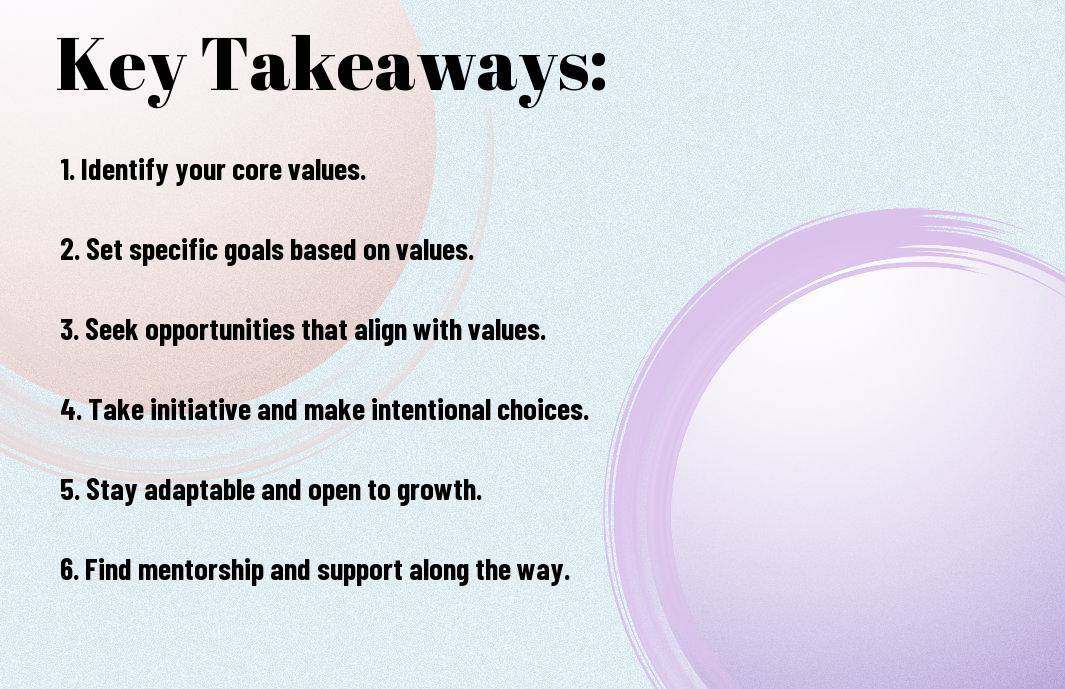
Newsletter Subscribe
Enter your email address below and subscribe to our newsletter

Enter your email address below and subscribe to our newsletter

With professional fulfillment becoming increasingly tied to personal values, it is crucial to craft a career that resonates with who you are and what you believe in. In this blog post, we will probe into the steps you can take to bridge the gap between your vision for a meaningful career and the actionable strategies needed to bring that vision to life.

You have decided to take the first step towards building a career that truly resonates with who you are at your core. Understanding your core values is crucial in this journey as they serve as the guiding principles that shape your decisions and actions. By aligning your career with your values, you can create a sense of purpose and fulfillment in your professional life.
One of the fundamental steps in understanding your core values is to distinguish between personal and professional values. Personal values are beliefs and principles that are important to you as an individual, such as honesty, integrity, and compassion. On the other hand, professional values are specific to your work life and may include aspects like innovation, collaboration, and achievement. Identifying these values will help you gain clarity on what matters most to you in both your personal and professional spheres.
To investigate deeper into your core values, there are various methods you can employ for self-assessment. One popular technique is to reflect on past experiences that have brought you the most joy and satisfaction. Another approach is to engage in activities like journaling or meditation to explore your thoughts and feelings. By taking the time to understand what truly drives you, you can gain insight into the values that are integral to your sense of fulfillment and purpose.
The process of self-assessment can be enlightening but may also uncover aspects of yourself that you may have overlooked or ignored. It is important to approach this exploration with an open mind and be willing to confront any discrepancies between your current actions and your core values. By embracing this self-discovery process, you can pave the way for a career path that is not only successful but also deeply fulfilling.

All too often, individuals pursue careers that do not resonate with their values, leading to dissatisfaction and lack of fulfillment. For a successful and meaningful career journey, it is imperative to identify industries and roles that align with your core values. Reflect on what truly matters to you – whether it be environmental sustainability, social justice, innovation, or others – and seek out opportunities that match these values. Research industries and companies that prioritize these core values, as well as roles within organizations that allow you to make a positive impact aligned with your beliefs.
Opportunities abound for those who are keen on building a career that aligns with their values. By evaluating current trends and future opportunities in various industries, you can gain valuable insights into where your skills and passions may be best utilized. Stay informed about market shifts, emerging technologies, and societal changes that may create new avenues for you to pursue your career goals. Understanding these trends can help you position yourself for success and navigate towards roles that offer growth and alignment with your values.
Roles that offer a combination of stability, growth potential, and alignment with your values are highly sought after in today’s job market. By leveraging your understanding of industry trends and future opportunities, you can identify roles that not only resonate with your values but also provide a promising career path. Look for positions that allow you to contribute meaningfully to causes you are passionate about, while also offering room for professional development and advancement.
Once again, it’s crucial to start the process of building a career that aligns with your values by setting clear and achievable goals. Setting career goals is crucial to provide direction, motivation, and a sense of purpose in your professional journey.
Career goals can be categorized into short-term objectives that focus on immediate actions and outcomes, and long-term objectives that entail broader achievements over an extended period. Short-term goals could include securing a new certification, gaining relevant experience in a specific field, or completing a project successfully. Long-term goals, on the other hand, might involve reaching a leadership position, starting a business, or making a significant impact in your industry.
Any effective goal-setting strategy begins with the SMART framework – Specific, Measurable, Achievable, Relevant, and Time-bound. Specific goals are clear and well-defined, while measurable goals can be quantified to track progress. Achievable goals are realistic given your current resources and abilities, while relevant goals align with your values and long-term aspirations. Time-bound goals have a deadline or defined timeline for completion.
Planning your career goals using the SMART framework provides a structured approach that increases the likelihood of success. It helps you focus on what truly matters, prioritize effectively, and track your progress systematically. By setting SMART goals, you pave the way for a fulfilling career that not only aligns with your values but also propels you towards your desired future.
For individuals looking to align their career with their values, it’s crucial to start by identifying any skill gaps and educational needs that may exist. Conduct a thorough self-assessment to determine where your strengths lie and where improvements can be made. Identifying these gaps early on will allow you to focus on acquiring the necessary skills and education required to pursue a career that resonates with your values.
On your journey towards building a meaningful career, it is crucial to leverage resources for professional development. Skills development workshops, online courses, mentorship programs, and networking events can all be valuable resources to enhance your skill set and knowledge base. By actively seeking out these opportunities, you can continuously improve and grow in your chosen field.
Skill development is an ongoing process that requires dedication and a willingness to learn. By taking advantage of various resources available for professional development, you can stay ahead of industry trends and position yourself for success in a career that aligns with your values.
Continuing your education through formal degree programs, certifications, or specialized training courses can provide you with the academic foundation and expertise needed to excel in your chosen field. Look for programs that align with your career goals and offer opportunities for hands-on learning and practical skill development.

Keep How do the mission and vision align with your own educational and personal goals in mind as you navigate the professional landscape. Networking is a crucial aspect of building a successful career that aligns with your values. By connecting with like-minded professionals, you can gain valuable insights, opportunities, and support. Attend industry events, join online communities, and engage in networking activities to expand your circle and cultivate meaningful relationships.
Networking is not just about collecting business cards; it’s about fostering genuine connections. Take the time to get to know people beyond their job titles. Show a genuine interest in their work and offer your support where you can. Building professional relationships based on mutual respect and trust can open doors to new opportunities and collaborations.
For those looking to accelerate their professional growth, finding a mentor can be invaluable. A mentor can provide guidance, support, and wisdom based on their experiences in the field. Look for someone who embodies the values and principles you admire, and who is willing to invest their time and energy in helping you succeed.
With a mentor by your side, you can navigate challenges more effectively, gain new perspectives, and set clearer goals for your career development. Be open to feedback and willing to learn from their insights to make the most of this valuable relationship.
Unlike simply dreaming about your ideal career, executing your career plan requires a strategic approach and intentional actions. It involves diligent effort, resilience, and a clear focus on your goals. By taking proactive steps, you can transform your vision into a reality and build a career that aligns with your values.
Search Effective job search strategies are necessary for finding opportunities that resonate with your career goals and values. Start by networking with professionals in your industry, utilizing online job boards, attending career fairs, and reaching out to potential employers directly. Tailor your resume and cover letter for each application to showcase how your skills and experiences align with the job requirements. Stay organized and persistent in your job search efforts to increase your chances of landing interviews.
One of the most critical phases in building a career that aligns with your values is the interview and negotiation process. Prepare for interviews by researching the company, practicing common interview questions, and articulating how your values align with the organization’s mission. When negotiating offers, be prepared to advocate for your worth, including salary, benefits, and opportunities for growth. Keep in mind, it’s necessary to stand firm on what aligns with your values and career goals, even if it means walking away from a potential opportunity that doesn’t meet your criteria.
Career advancement requires a strategic approach to interviewing and negotiating offers. It is crucial to present yourself confidently, highlighting your strengths and how they align with the organization’s values. Negotiating offers should be done from a position of strength, knowing your worth and what you bring to the table. This process is not just about securing a job, but about building a career that fulfills you professionally and personally.
Your A Step-By-Step Guide To Creating a Personal Vision Statement serves as a roadmap in aligning your career with your values and goals. As you move through different phases of your professional life, it’s crucial to navigate career transitions with confidence and purpose. Whether you are considering a job change, promotion, or a shift in your industry, managing change and uncertainty is crucial.
Career transitions can bring about a mix of emotions, including excitement, fear, and doubt. It’s important to approach these changes with a clear mindset and a proactive attitude. Embrace the opportunity for growth and development, even if it means stepping out of your comfort zone. Do not forget, change is inevitable in a dynamic workforce. Stay adaptable, seek out opportunities for learning, and leverage your skills and experiences to thrive in new environments.
Your work-life balance and overall well-being are integral to your long-term success and satisfaction in your career. Balancing your professional responsibilities with personal time and self-care is crucial to avoid burnout and maintain peak performance. Prioritize activities that recharge you, set boundaries between work and personal life, and seek support from colleagues, friends, or mentors when needed. Do not forget, self-care is not selfish; it’s a necessary investment in your overall well-being.

Despite reaching a certain level of success in your career, it is crucial to continue striving for growth and development. Maintaining career growth requires a proactive approach and a willingness to adapt to new challenges and opportunities.
On the journey of career growth, one must prioritize continuous learning and adaptability. The professional landscape is constantly evolving, with new technologies, trends, and methodologies emerging regularly. Staying current in your field and expanding your skill set through workshops, courses, or certifications is crucial in remaining competitive and valuable in the workforce. Embracing a mindset of lifelong learning not only enhances your expertise but also demonstrates your commitment to personal and professional growth.
To further your career growth, it is vital to seek out and seize leadership opportunities and advancements within your organization or industry. By taking on leadership roles, whether through leading projects, teams, or initiatives, you showcase your leadership potential and ability to drive positive change. Additionally, actively pursuing advancements such as promotions or lateral moves into roles of greater responsibility can propel your career to new heights.
Plus, developing strong leadership skills not only benefits your career progression but also enables you to influence and inspire others within your professional sphere. Leadership positions often require a combination of strategic thinking, effective communication, and the ability to motivate and empower team members towards shared goals.
Considering all points discussed in this guide, it is evident that building a career that aligns with your values requires careful consideration of personal values, long-term goals, and practical steps toward achieving them. It is important to start with a clear vision of your values and how they translate into your professional life.
By taking intentional actions, such as researching potential employers, networking with like-minded professionals, and seeking mentorship or ongoing education, you can create a rewarding career that reflects your values. Remember that aligning your values with your career is an ongoing process that may require adjustments along the way, but the outcome is a fulfilling and purpose-driven professional journey.
A: Building a career that aligns with your values involves choosing a path that resonates with your beliefs, principles, and priorities. It means pursuing work that reflects who you are and what you stand for.
A: Having a career that aligns with your values leads to greater job satisfaction, fulfillment, and overall happiness. It creates a sense of purpose and meaning in your work life, enhancing your motivation and productivity.
A: To identify your core values, take time to reflect on what matters most to you in life. Consider your beliefs, passions, and what brings you joy. Think about the kind of impact you want to make in the world and what you want to be remembered for.
A: To align your career with your values, start by clearly defining your values and priorities. Research industries and companies that share those values. Network with professionals who are already working in fields that interest you. Be willing to make changes and take risks to pursue a career that aligns with your values.
A: In a competitive job market, it may be challenging to find opportunities that perfectly align with your values. However, you can stay true to your values by being selective about the job offers you accept, seeking companies with strong ethical principles, and negotiating for work that allows you to uphold your values.
A: The benefits of aligning your career with your values include increased job satisfaction, better work-life balance, higher motivation, improved performance, and a sense of fulfillment. You are more likely to thrive and succeed when your work is in harmony with your values.
A: Conflicts between your values and career responsibilities are common. To deal with such conflicts, communicate openly with your employer about your concerns. Seek compromises or alternative solutions that allow you to maintain your values while meeting your job requirements. If necessary, consider seeking opportunities elsewhere that better align with your values.